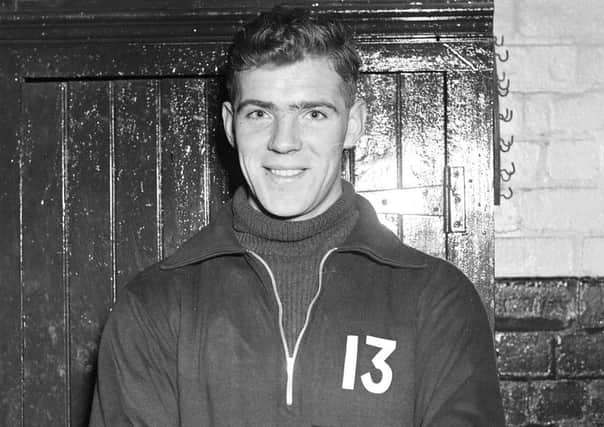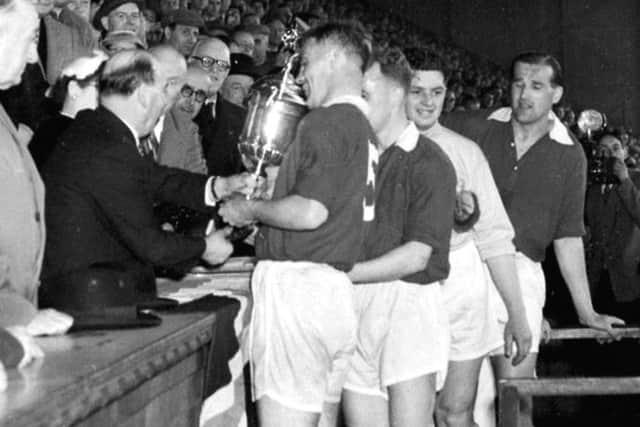Obituary: Frederick '˜Freddie' Glidden, Hearts captain who lifted the Scottish Cup in 1956


THE year 2019 began badly for the Heart of Midlothian FC family, with the death, at the age of 91 of former centre-half Freddie Glidden, the captain and last survivor of the legendary XI which won the Scottish Cup in 1956, ending a barren 50-year spell in the competition for the Maroons.
Glidden, who lined up alongside team mates such as Dave Mackay, John Cumming, the incomparable Conn, Bauld and Wardhaugh “Terrible Trio” and Alex Young – all of whom played that day – was seen as the “glue” which held together the team during what is now seen as a golden era around Tynecastle.
Advertisement
Hide AdAdvertisement
Hide AdHe was a stand-in as captain that day, with Bobby Parker missing out through injury, but he carried the burden of leadership lightly.


“I think I only got the job because I was the centre-half,” he said years later, in an interview with The Scotsman’s Moira Gordon. He revealed then, the victorious team were paid £66, three shillings and four pence – rather more than their usual £2 win bonus.
Born in Bonkle, thereby giving that hamlet a football presence long before referee Hugh Dallas, Glidden’s family made the short journey from Lanarkshire to West Lothian, where he was raised in Stoneyburn. Leaving Bathgate Academy, he went to work with the West Lothian Water Board – indeed, he continued to work for that body throughout his playing career. He was always a part-time footballer, often coming off a Friday night shift to play for Hearts on a Saturday.
The club first spotted him playing in juvenile football with Murrayfield Rovers, then the Whitburn Home Guard XI and on 23 June, 1947, Hearts’ manager Willie McLean signed him, from Whitburn Juniors, loaning him to Newtongrange Star, with whom he won two Junior Scotland “caps” – his only representative honours.
He made the first of his 270 first-team appearances for Hearts, against Edinburgh City, in an East of Scotland Cup tie on 18 April, 1949, but he took a long time to establish himself in the first team at Tynecastle, initially as a right half, before, after Scotland cap Bobby Dougan sustained a bad knee injury, he moved to centre-half, just as Tommy Walker began to put together his great side.
He was the pivot when the club’s long trophy drought was ended with the League Cup win in October 1954, when, on the back of a Willie Bauld hat-trick, they beat Motherwell – the team Glidden had supported as a boy – 4-2 to lift the club’s first trophy in nearly 50 years. That breakthrough kick-started a stellar period for Hearts.
The 1956 Scottish Cup success, beating Celtic 3-1, was followed by a wonderful League Championship in 1958; the team scoring 132 goals and losing just one league game all season, at Clyde in November, 1957. This brought a first taste of European football the following season, but this was a chastening experience, a 5-1 loss to Standard Liege all but eliminating Hearts, before a Bauld double helped them win the second leg at Tynecastle 2-1, but go out on a 6-3 losing aggregate.
Just a few weeks later, there was another 5-1 game, the Glidden-led Hearts beating Partick Thistle by that score to win the League Cup. That was Glidden’s final hurrah as a regular. A persistent back injury had begun to curtail his appearances. His final first-team game was a 3-2 loss to Kilmarnock, at Rugby Park and in March, 1959, he left the club to play out his senior career with Dumbarton, finally hanging up his boots in 1962.
Advertisement
Hide AdAdvertisement
Hide AdHe remained, however, a Hearts fan but, in solidarity with his old team-mate, he seldom went near Tynecastle, following the celebrated incident of the club’s tight-fistedness towards Willie Bauld’s testimonial. He did, however, miss few Willie Bauld memorial dinners. He left the Water Board to run sub-post offices in Edinburgh, initially in Grove Street, then in Shandon Place, a long free-kick from Tynecastle, up until his retirement.
He was admitted to the Hearts Hall of Fame in 2007, to popular acclaim.
“He was a real gentleman,” said former Hearts chairman Lord George Foulkes. “I met him at the regular Willie Bauld memorial dinners and he was such a nice man.
“Freddie is part of Hearts’ history and he will be sadly missed. I don’t remember him as a player but I got to know him quite well as a former player when the club had various events.
“He carried his fame very lightly, he never got carried away with it at all. He was very understated and a very modest man. He was actually always a bit taken aback by how many people knew about him and wanted to meet him.”
Glidden always laughed at how Hearts had beaten Celtic to Hampden’s home dressing room for the cup final, and stayed in touch with his team mates over the years. He also golfed enthusiastically at Ratho Park for many years.
Freddie Glidden is survived by his wife Rosa, sons Alistair and Andrew, daughter Susan, six grandchildren and two great-grandchildren.
MATT VALLANCE